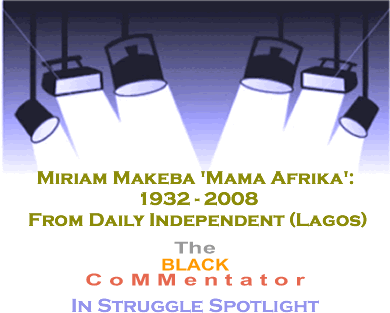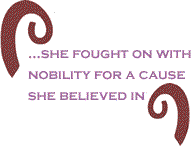
|
|||||||||||||||||||||||

|
|

Custom Search
|
|
 |
|
12 November 2008 Fittingly, the South African
icon Miriam Makeba passed on after performing at a concert in Her demise represents a profound loss to the African continent. Her musical contribution was a factor in bringing down the obnoxious apartheid system. There is every reason to be grateful that she lived to see the unmourned dismantling of that system. She could, of course, have taken
the other route. Collaboration with the apartheid government would
have made her life much more comfortable. She would definitely have
saved herself the inconvenience of exile. The price was high. For
example, in 1960 her attempt to return home to By deploying her talents, she
set an example for a host of other artistes and musicians. Activitism
such as hers was a precursor for later initiatives by musicians
such as the “Concert for
The process that people like Makeba initiated can best be captured in a statement by the American President-elect, Barack Obama, who stated during his election campaign that “Change will not come if we wait for some other person or some other time. We are the ones we have been waiting for. We are the change that we seek”. Her noble role is in stark contrast to those (admittedly) lesser talented Nigerian musicians who repugnantly collaborated for pecuniary benefit in offering their services to Sani Abacha’s so-called million man march. Makeba’s activitism straddled
the decisive phase of the anti-apartheid struggle. She entered international
prominence when she appeared in the anti-apartheid documentary “Come
Back, She was awesomely talented. Some of her hit songs such as “Pata Pata”, “The Click song” and “Malaika” are not just evergreen, they have become seminal classics. She started her career first
of all with an amateur group. In the 1950s she became a full time
singer appearing with a band called “The Manhattan Brothers”, before
forming her own group, “The Skylarks” whose repertoire infused a
blending of jazz with the traditional melodies of indigenous Not surprisingly, the singer as activist who was received by world leaders such as John F. Kennedy, Fidel Castro, Francois Mitterand, Haile Sellasie amongst others has been showered with accolade since her demise at home and abroad. In her own country of origin, the African National Congress (ANC), which spearheaded the struggle against the apartheid regime was fulsome in its tribute. “The ANC will forever treasure the contribution made by Miriam Makeba in the struggle for liberation and building of our democracy”, the Party stated. Younger artists for whom she
was an endearing role model also mourned her passing. The South
African diva, Yvonne Chaka Chaka, stated that “she is a legend.
We will surely miss her.” Here in This newspaper salutes the indomitable courage of Mama Afrika. Her life is a testimony to courage and the use of God-given talents for the benefit of humanity. She made us all feel so proud to be Africans. Originally published in Daily
Independent, Books Makeba:
The Miriam Makeba Story
Music Mama
Africa: The Very Best of Miriam Makeba Her
Essential Recordings: The Empress of African Song In
Concert! / Pata Pata / Makeba! Miriam
Makeba / World of Miriam Makeba Paul
Simon - Graceland (The African Concert) The
Best of Miriam Makeba and the Skylarks Evening
With Miriam Makeba / Magic of Miriam
Miriam
Makeba & the Skylarks, Vol. 1
Miriam
Makeba & the Skylarks, Vol. 2
Only
the Best of Miriam Makeba Global
Divas - Voices From Women of the World (3 Cd Set)
Mama
Africa: The Very Best of Miriam Makeba
DVD |
|
Any BlackCommentator.com article may be re-printed as long as it is re-printed in its entirety and full credit given to the author and www.BlackCommentator.com. If the re-print is on the Internet we additionally request a link back to the original piece on our Website. Your comments are always welcome. eMail re-print notice
If you send us an eMail message we may publish all or part of it, unless you tell us it is not for publication. You may also request that we withhold your name. Thank you very much for your readership. |
|
| |
|
| November 20, 2008 Issue 300 |
|
| Executive Editor: Bill Fletcher, Jr. |
| Managing Editor: Nancy Littlefield |
| Publisher: Peter Gamble |
| Est. April 5, 2002 |
Printer Friendly Version
in resizeable plain
text format or pdf
format. |
| Frequently Asked Questions |
 |

|
 |
 |
 |
| |
| |




































